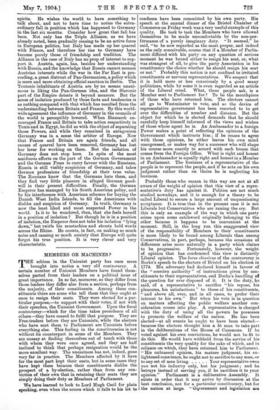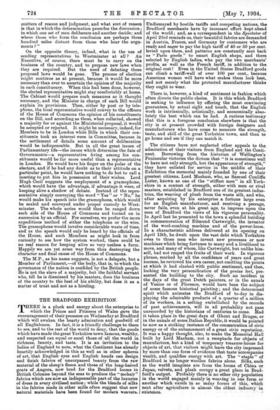T HE schism in the Unionist party has once more brought
into notice a very old controversy. A certain number of Unionist Members have found them- selves parted from their leaders on a political issue of great importance. In so far, moreover, as they differ from those leaders they differ also from a section, perhaps from the majority, of their constituents. Among these con- stituents there are some who tell them that they ought at once to resign their seats. They were elected-for a par- ticular purpose,—to support with their votes, if not with their speeches, the Unionist Government. Upon the fiscal controversy—which for the time takes precedence of all others—they have ceased to fulfil that purpose. They are Free-traders before they are Unionists, while the electors who have sent them to Parliament are Unionists before everything else. This feeling in the constituencies is not without its counterpart in some of the Members. They are uneasy at finding themselves out of touch with those with whom they were once agreed, and they are half inclined to think that perhaps resignation would be the more excellent way. The uneasiness has not, indeed, gone very far in practice. The Members affected by it have for the most part kept their seats, but in some cases they have kept them because their constituents dislike the prospect of a by-election, rather than from any con- viction of their own that in retaining their seats they are simply doing their duty as Members of Parliament.
We have learned to look to Lord Hugh Cecil for plain speaking, even when the errors which it falls to his lot to condemn have been committed by his own party. His speech at the annual dinner of the Bristol Chamber of Commerce on Friday week was a very useful example of this quality. He took to task the Members who have allowed themselves to be made uncomfortable by the non-per- fdrmance of a purely imaginary duty. " It seemed," he said, "to be now regarded as the most proper, and indeed as the only conceivable, course that if a Member of Parlia- ment differed with his party on any question of serious moment he was bound either to resign his seat, or, what was strangest of all, to give the party Association in his constituency the choice whether he should resign his seat or not." Probably this notion is not confined to irritated constituents or nervous representatives. We suspect that it is held more or less consciously by a good many politicians, while by some it is even regarded as an article of the Liberal creed. What, these people ask, is a Member sent to Parliament for ? To be the mouthpiece of those who have returned him. The electors cannot all go to Westminster to vote, and so the device of representative government has been resorted to to get over the difficulties of number and distance. But the object for which he is elected demands that he should carefully keep himself informed of the views and wishes of those whose agent he is. An Ambassador to a foreign Power makes a point of reflecting the opinions of the Government which instructs him ; if he ceases to agree with those opinions, he either leaves his own mind unexpressed, or makes way for a successor who will shape his course more exactly in accord with each breeze that comes from the Foreign Office. What is right and honest in an Ambassador is equally right and honest in a Member of Parliament. The business of a representative of the people is to represent the people, and if he acts on his own judgment rather than on theirs he is neglecting his business.
Probably those who reason in this way are not at all aware of the weight of opinion that this view of a repre- sentative's duty has against it. Politics are not much studied nowadays, and it is enough for a theory to be called Liberal to secure a large amount of unquestioning acceptance. It is true that in the present case it is not Liberals but Conservatives who are raising the cry. But this is only an example of the way in which one party seizes upon some catchword originally belonging to the other because it happens to be convenient at the moment. Still, in the long run this exaggerated view of the responsibility of Members to their constituents is more likely to be found among Liberals than among Conservatives, in part, perhaps, because the occasions of difference arise more naturally in a party which claims to be progressive. Fortunately, however, the weight of opinion that has condemned this view is distinctly Liberal opinion. The locus classicu8 of the controversy is Burke's speech to the electors of Bristol on his election in 1774. His adversary had declared himself in favour of the " coercive authority " of instructions given by con- stituents to their representatives, and Burke's handling of the question for ever disposed of it. It is the duty, he said, of a representative to sacrifice "his repose, his pleasures, his satisfactions " to those of his constituents, " and above all, ever, and in all cases, to prefer their interest to his own." But when his vote is in question on matters affecting the public welfare another con- sideration, comes into play. A. representative is charged with the duty of using all the powers he possesses to promote the welfare of the nation. He has been elected—at all events he ought to have been elected— because the electors thought him a fit man to take part in the deliberations of the House of Commons. If he voted against his own convictions, he would not be fit to do this. He would have withheld from the service of his constituents the very quality for the sake of which, and in reliance on which, they have returned him to Parliament. " His unbiassed opinion, his mature judgment, his en- lightened conscience, he ought not to sacrifice to any man, or to any set of men living Your representative owes you not his industry only, but his judgment ; and he betrays instead of serving you, if he sacrifices it to your opinion." Parliament is a deliberative Assembly. It exists in order that it may arrive by discussion at the best conclusion, not for a particular constituency, but for the nation, at large. " Gwernment and legislation are matters of reason and judgment, and what sort of reason is that in which the determination precedes the discussion ; in which one set of men deliberate and another decide; and where those who form the conclusion are perhaps three hundred miles distant from those who hear the argu- ments ? "
On the opposite theory, indeed, what is the use of sending representatives to Westminster at all ? An Executive, of course, there must be to carry on the business of the country, and to propose new laws when they are required. But the need of debating these proposed laws would be gone. The process of election might continue as at present, because it would be more necessary than ever to ascertain the opinion of the majority in each constituency. When this had been done, however, the elected representative might stay comfortably at home. The Cabinet would prepare such measures as it thought necessary, and the Minister in charge of each Bill would explain its provisions. Then, either by post or by tele- phone, the local representative would convey to the officers of the House of Commons the opinion of his constituents on the Bill, and according as these, when collected, showed a majority for or against the Ministerial proposal, it would be accepted or rejected. It might be necessary, indeed, for Members to be in London while Bills in which their con- stituents took an interest were in Committee, because in the settlement of details some amount of deliberation would be indispensable. But in all the great issues of Parliamentary life—the issues which determine the fate of Governments—a representative living among his con- stituents would be far more useful than a representative in London. He would have his finger on the pulse of the electors, and if he had any doubt as to their attitude on a particular point, he would have nothing to do but to call a meeting to put him in possession of their wishes. Lord Hugh Cecil suggests the employment of a gramophone, which would have the advantage, if advantage it were, of keeping alive a shadow of debate. Instead of the repre- sentative simply conveying the word " Yes " or " No,' he would make his speech into the gramophone, which would be sealed and conveyed under proper custody to West- minster. The whole series would then be ranged down each side of the House of Commons and turned on in succession by an official. For ourselves, we prefer the more expeditious method of either the telephone or the wire. The gramophone would involve considerable waste of time, and as the speech would only be heard by the officials of the House, and such Members as might look in from curiosity to see how the system worked, there could be no real reason for keeping alive so very useless a form. Happily we are yet some way from thus destroying the character and final cause of the House of Commons.
The M.P., as his name suggests, is not a delegate, but a Member of Parliament,—of the body, that is, to which the governance of the nation is confided by the British people. He is not the slave of a majority, but the faithful servant who, till he is dismissed by his masters, does the business of the country to the best of his ability, but does it as a matter of trust and not as a hireling.











































 Previous page
Previous page